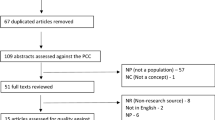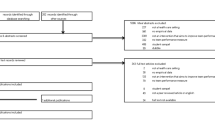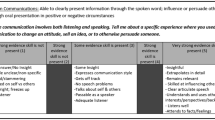Abstract
The landscape of surgical training is changing. The anticipated increase in the numbers of surgical trainees and the shift to competency-based surgical training places pressures on an already stretched health service. With these pressures in mind, we explored trainers’ and trainees’ experiences of surgical training in a less traditional rotation, an outer metropolitan hospital. We considered practice-based learning theories to make meaning of surgical training in this setting, in particular Actor–network theory. We adopted a qualitative approach and purposively sampled surgical trainers and trainees to participate in individual interviews and focus groups respectively. Transcripts were made and thematically analysed. Institutional human research ethics approval was obtained. Four surgical trainers and fourteen trainees participated. Almost without exception, participants’ report training needs to be well met. Emergent inter-related themes were: learning as social activity; learning and programmatic factors; learning and physical infrastructure; and, learning and organizational structure. This outer metropolitan hospital is suited to the provision of surgical training with the current rotational system for trainees. The setting offers experiences that enable consolidation of learning providing a rich and varied overall surgical training program. Although relational elements of learning were paramount they occurred within a complex environment. Actor–network theory was used to give meaning to emergent themes acknowledging that actors (both people and objects) and their interactions combine to influence training quality, shifting the focus of responsibility for learning away from individuals to the complex interactions in which they work and learn.
Similar content being viewed by others
References
Barbour, R. S. (2005). Making sense of focus groups. Medical Education, 39(7), 742–750. doi:10.1111/j.1365-2929.2005.02200.x.
Billet, S. (1996). Situated learning: Bridging sociocultural and cognitive theorising. Learning and Instruction, 6(3), 263–280.
Bleakley, A. (2006). Broadening conceptions of learning in medical education: The message from teamworking. Medical Education, 40(2), 150–157. doi:10.1111/j.1365-2929.2005.02371.x.
Bleakley, A. (2012). The proof is in the pudding: Putting actor–network-theory to work in medical education. Medical Teacher, 34(6), 462–467.
Bleakley, A. (2014). Patient-centred medicine in transition: The heart of the matter. London: Springer.
Braun, V., & Clarke, V. (2006). Using thematic analysis in psychology. Qualitative Research in Psychology, 3, 77–101.
Cope, A., Mavrovelli, S., Bezemer, J., Hanna, G., & Keneebone, R. (2015). Making meaning from sensory cues: A qualitative investigation of postgraduate learning in the operating room. Academic Medicine, 90(8), 1125–1131.
Crabtree, B. F., & Miller, W. L. (1999). Doing qualitative research (2nd ed.). Calfornia: Sage.
Creswell, J. W. (1998). Qualitative inquiry and research design. California: Sage.
Dornan, T., & Nestel, D. (2013). Talking, touching, and cutting: The craft of medicine. Journal of Modern Craft, 6(1), 35–48.
Fenwick, T., & Dahlgren, M. A. (2015). Towards socio-material approaches in simulation-based education: Lessons from complexity theory. Medical Education, 49(4), 359–367. doi:10.1111/medu.12638.
Frank, J. (2005). The CanMEDS 2005 physician competency framework. Better standards. Better physicians. Better care. Ottawa: The Royal College of Physicians and Surgeons of Canada.
Hillis, D. J., Gorton, M. W., Barraclough, B. H., & Beckett, D. (2015). Priorities for professionalism: What do surgeons think? Medical Journal of Australia, 202(8), 433–437.
Ibrahim, E. F., Richardson, M. D., & Nestel, D. (2015). Mental imagery and learning: A qualitative study in orthopaedic trauma surgery. Medical Education, 49(9), 888–900. doi:10.1111/medu.12759.
Kieu, V., Stroud, L., Huang, P., Smith, M., Spychal, R., Hunter-Smith, D., et al. (2015). The operating theatre as classroom: A qualitative study of learning and teaching surgical competencies. Education for Health, 28(1), 22–28.
Kneebone, R., & Nestel, D. (2010). Learning and teaching clinical procedures. In S. E. Dornan (Ed.), Medical education: Theory and practice. London: Elsevier.
Latour, B. (2007). Reassembling the social: An introduction to actor–network-theory. Oxford: Oxford University Press.
Mahoney, A., Crowe, P., & Harris, P. (2010). Exploring Australasian surgical trainees’ satisfaction with operating theatre learning using the ‘Surgical Theatre Educational Environment Measure’. ANZ Journal of Surgery, 80(12), 884–889.
Morgan, D., & Spanish, M. (1984). Focus groups: A new tool for qualitative research. Qualitative Sociology, 7(3), 253–270.
Nestel, D., & Burgess, A. (2014). Surgical education and the theoretical concept of communities of practice. Journal of Health Specialties, 2, 49–53.
Ong, C. C., Dodds, A., & Nestel, D. (2016). Beliefs and values about intra-operative teaching and learning: A case study of surgical teachers and trainees. Advances in Health Sciences Education, 21(3), 587–607.
Regeher, G. (2004). Trends in medical education research. Academic Medicine, 79(10), 939–947.
Regeher, G. (2010). It’s NOT rocket science: Rethinking our metaphors for research in health professions education. Medical Education, 44, 31–39.
Royal Australasian College of Surgeons. (2011). Surgical Workforce Projection to 2025—The Australian Workforce (Vol. 1). Melbourne: RACS.
Royal Australasian College of Surgeons. (2012). Becoming a competent and proficient surgeon: Training standards for the nine RACS competencies. Melbourne: RACS.
Royal Australasian College of Surgeons. (2013). Appropriate working Hours for Surgical Training in Australia and New Zealand. RACS.
Royal Australasian College of Surgeons and The Specialist Surgical Associations and Societies of Australia and New Zealand. (2008). Accreditation of hospitals and posts for surgical education and training: Process and criteria for accreditation. Melbourne: Royal Australasian College of Surgeons.
Sarantakos, S. (1998). Social research (2nd ed.). Melbourne: MacMillan Education Australia Pty Ltd.
Wenger, E. (1998). Communities of practice: Learning, meaning and identity. Cambridge: Cambridge University Press.
Author information
Authors and Affiliations
Corresponding author
Rights and permissions
About this article
Cite this article
Nestel, D., Harlim, J., Bryant, M. et al. Surgical education and training in an outer metropolitan hospital: a qualitative study of surgical trainers and trainees. Adv in Health Sci Educ 22, 639–651 (2017). https://doi.org/10.1007/s10459-016-9697-2
Received:
Accepted:
Published:
Issue Date:
DOI: https://doi.org/10.1007/s10459-016-9697-2




